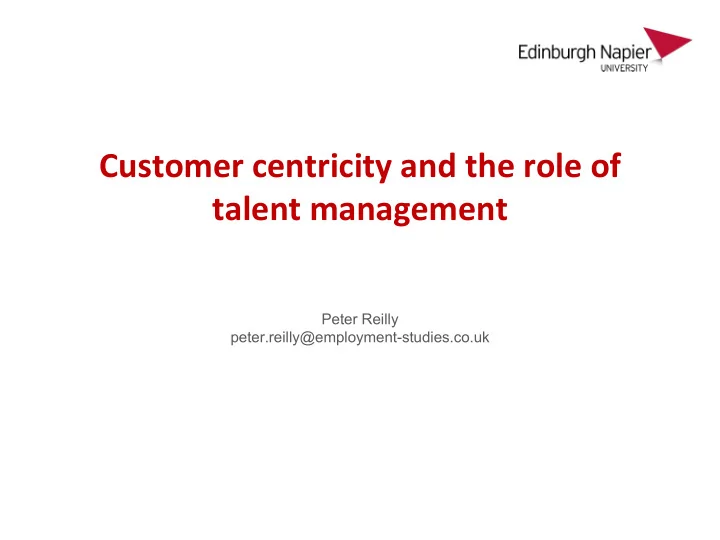

Customer centricity and the role of talent management Peter Reilly peter.reilly@employment-studies.co.uk
hospitality ‘Applying for low-paid retail jobs used to involve a short chat with the manager. So why do employers increasingly make interviews feel like auditions for a West End show?’ Daniel Lavell, Want a shop job? You've got to have the X Factor, The Guardian 27 th February 2018
Is talent management a strategic priority in the hospitality sector? Editor: Norma d’Annunzio-Green WHATT 10,1 Building customer centricity in the hospitality sector: the role of talent management 42 Peter Reilly Edinburgh Napier University, Edinburgh, UK
Journal’s objective WHATT uses questions to find and apply solutions to industry challenges and every issue: 1. Provides theme-based reviews of real industry issues. 2. Draws on analysis, applied research and dialogue with industry. 3. Offers practical solutions (to industry challenges) in concise, accessible articles. 4. Develops industry-based frameworks that can be used.
Different approaches to talent management Everyone is talented High professionals (in critical roles) Leadership High and (leadership) successors potential
Talent management becomes a business priority Customer centricity a business requirement The rise of the ‘experience economy’ Move from standardised to bespoke products Adjustments to: • structures, processes, metrics and incentives • behaviours and culture • the practice of talent management
So talent management reimagined From To General Agent of culture resourcing change and through selection, Hipo focused development & development leadership service>profit chain
Evidence of a different talent approach • Hire for attitude train for skills • Build more than buy Supply side • Emphasis on retention • Employment as a career • Centrality of leadership (skills) • Aligning resourcing with the business strategy – Common employee and product branding – Workforce and customer segmentation Business – Organisational structure and resourcing integration – Flexible development and deployment – People in performance scorecards • Values-led people management, eg – Performance management Cultural development – Reward
Challenges in delivering the talent goal Labour supply Job demands • ‘leadership deficit’ ‘a lot of people can’t handle • brand perception customer complaints, • competition requests and feedback as our staff have to’. • Brexit Emotional labour is hard… • skill retention Internal resistance Process obsession • management style Losing sight of strategic • policies not adopted goals by being fixated • local:corporate tension with detail of HR stuff • staff impatience ‘
Challenges in delivering the talent goal Labour supply Job demands • ‘leadership deficit’ ‘a lot of people can’t handle • brand perception customer complaints, • competition requests and feedback as our staff have to’. • Brexit Emotional labour is hard… • skill retention Cost pressures Transient workers Internal resistance Process obsession • management style Losing sight of strategic • policies not adopted goals by being fixated • local:corporate tension with detail of HR stuff • staff impatience ‘
What can be done? • Make a more attractive sector (especially compared with retail) • Build sector capability (eg through apprenticeships) • Be clear on the strategic aims of your talent approach • Communicate your talent strategy/processes to staff & managers • Sell the people component of your brands externally/internally • Develop the right leadership culture and credentials • Require management behaviour mirrors the message • Provide learning support to managers with stakeholder tensions • Develop ‘hospitableness’ skills appropriate to your business • Ensure HR is joined at the hip with the business • Evaluate the effect of your initiatives, and learn the lessons • Market your success (especially in global businesses)
“The key lever to the success and sustainability of talent management” * Corporate strategy Leadership HR (+ measurement & reward systems) Line Manager (conveying the organisational culture) External Internal Employees perceptions perceptions * D’Annunzio-Green and Teare (2018) Reflections on the theme issue outcomes Is talent management a strategic priority in the hospitality sector?
For further information contact: peter.reilly@employment-studies.co.uk … thank you
Recommend
More recommend